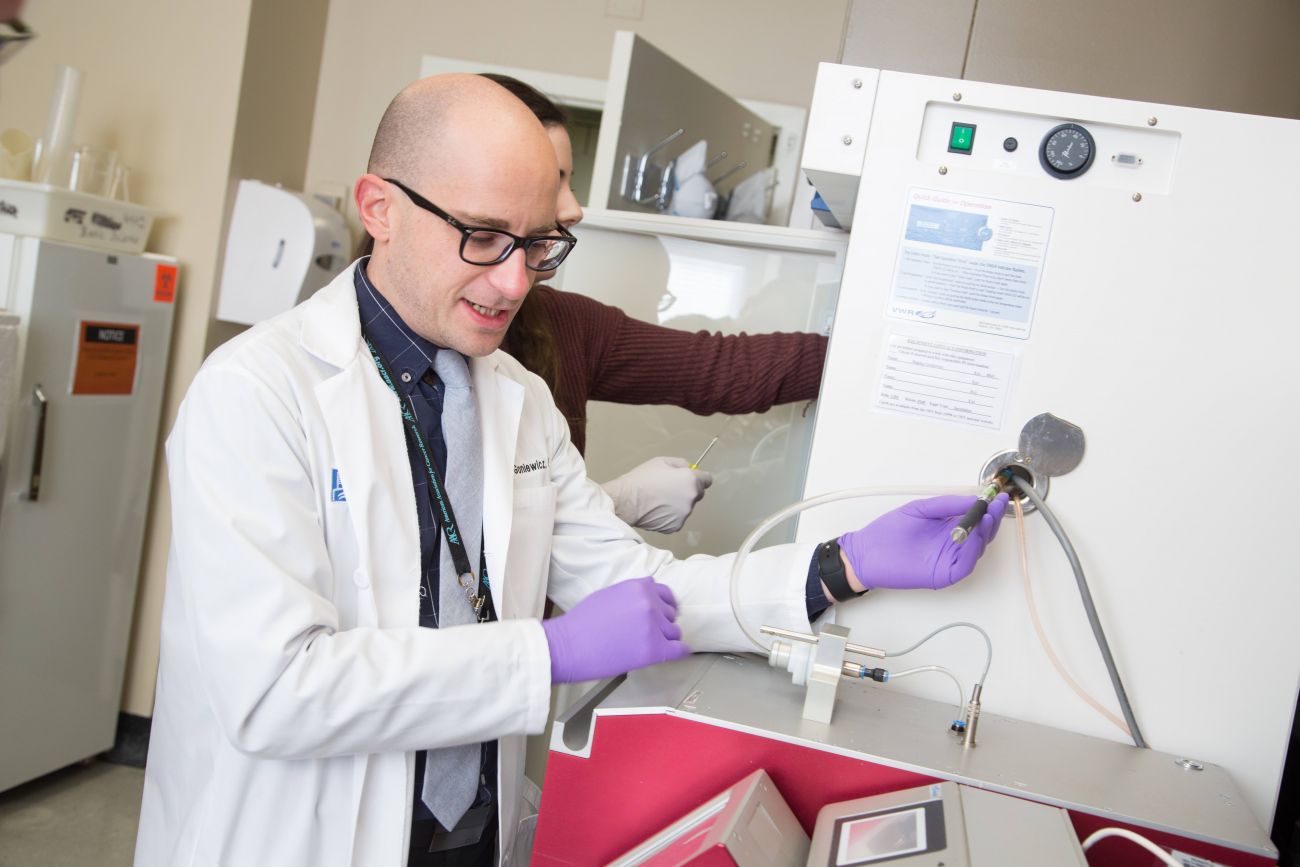Dual cigarette/e-cigarette users may be exposed to even higher levels of carcinogens than cigarette-only smokers
- Scientists from several institutions and agencies collaborated on new study
- They compared exposure to 50 different biomarkers among 5,000 U.S. adults
- E-cigarette users are exposed to toxicants, but much less so than smokers are
BUFFALO, N.Y. — The largest study to date to compare exposure to toxicants among users of electronic cigarettes, smokers and nonsmokers has been completed, suggesting possible benefits for smokers who switch completely to electronic cigarettes. The research team, led by Maciej Goniewicz, PhD, PharmD, and Andrew Hyland, PhD, of Roswell Park Comprehensive Cancer Center in collaboration with scientists from Westat, the National Institute on Drug Abuse (NIDA), the U.S. Food and Drug Administration (FDA) and other academic centers, saw clear evidence that e-cigarette users, while exposed to more toxicants than people who do not use any form of tobacco, evidence significantly lower levels of toxicants than those who smoke cigarettes.
The findings, which were based on the largest prospective U.S. study of tobacco use, were published today by the journal JAMA Network Open. Using data from 5,000 of the U.S. adults participating in the federally funded Population Assessment of Tobacco and Health (PATH) Study, between 2013 and 2014, the research team analyzed their use of tobacco, testing urine samples from these participants for key biomarkers of exposure to harmful chemicals.
The authors report two new findings that expand our understanding of the widespread impact of both tobacco and e-cigarettes among U.S. adults:
- Exclusive users of e-cigarettes who do not smoke combustible cigarettes were exposed to toxicants associated with tobacco use, but at significantly lower levels than smokers.
- Dual users, or people who both smoke cigarettes and use e-cigarettes, had toxicant exposures that were similar to or even higher than exposures for those who used cigarettes alone.
“Our goal was to give the public reliable information about the actual impacts that smoking and vaping have on individual users,” says Dr. Goniewicz, the study’s first author, who is Associate Professor of Oncology in the Department of Health Behavior at Roswell Park. “The findings are striking, because we now have solid evidence that e-cigarettes — while they still expose users to some toxicants — appear to significantly reduce this exposure compared to combustible cigarettes. But that reduction in exposure did not extend to dual users. This is important information for any e-cigarette users who continue to smoke tobacco cigarettes. Our data suggest that potential harm reduction can only be achieved if smokers switch completely to e-cigarettes and discontinue use of deadly combustible tobacco products.”
The scientists tested study participants for levels of 50 biomarkers of exposure to nicotine and other known tobacco product toxicants, breaking them down into four groups: current, exclusive users of e-cigarettes; exclusive users of combustible tobacco cigarettes; dual users of combustible and electronic cigarettes; and never-users of any tobacco products, including e-cigarettes. They found that e-cigarette-only users had statistically significantly greater concentrations of biomarkers of nicotine, tobacco-specific nitrosamines (TSNAs), volatile organic compounds (VOCs) and metals compared to those who never used tobacco products. However, these concentrations were significantly lower than the levels detected among current, exclusive cigarette smokers and dual users of both products.
Other noteworthy findings:
- Nearly all e-cigarette-only users — 93% — previously used cigarettes
- Among all e-cigarette-only users, 56% used e-cigarettes daily, compared to 20% of dual users who used e-cigarettes daily
- Cigarette consumption was similar between cigarette-only smokers and dual users — approximately 15 cigarettes per day
“We know that quitting cigarettes improves health dramatically, but we don’t know much about possible risks from smoking and vaping together,” adds Dr. Hyland, the Chair of Health Behavior at Roswell Park, Director of the New York State Smoker’ Quitline, scientific lead on the PATH Study and senior author on this new research. “These data are clear that cigarette smoking is the primary factor responsible for exposure to the toxicants measured in this study. Stopping smoking completely is the best thing a smoker can do for their health.”
Several of the biomarkers measured in this study are metabolites of known carcinogens or respiratory, cardiovascular, reproductive and developmental toxicants. While e-cigarette users should be aware that these products are sources of exposure to toxicants that are linked to illness, the authors note, the degree to which e-cigarette use may facilitate or hinder the development of disease remains unknown.
The study, “Comparison of Nicotine and Toxicant Exposure in Users of Electronic Cigarettes and Combustible Cigarettes,” is available at jamanetwork.com. This research was supported with federal funds from the National Institute on Drug Abuse, National Institutes of Health, and the Center for Tobacco Products, Food and Drug Administration, Department of Health and Human Services, under a contract to Westat (contract numbers HHSN271201100027C and HHSN271201600001C).
###
Roswell Park Comprehensive Cancer Center is a community united by the drive to eliminate cancer’s grip on humanity by unlocking its secrets through personalized approaches and unleashing the healing power of hope. Founded by Dr. Roswell Park in 1898, it is the only National Cancer Institute-designated comprehensive cancer center in Upstate New York. Learn more at www.roswellpark.org, or contact us at 1-800-ROSWELL (1-800-767-9355) or ASKRoswell@RoswellPark.org.
Annie Deck-Miller, Senior Media Relations Manager
716-845-8593; annie.deck-miller@roswellpark.org
